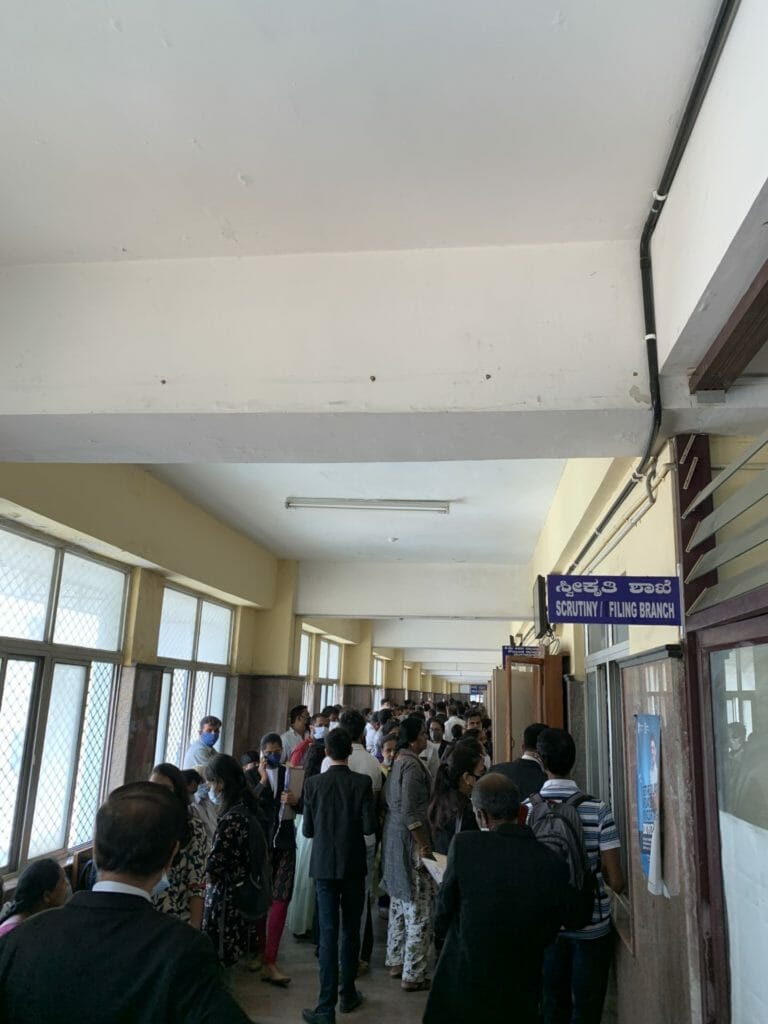Family courts, by definition, deal with speedy and secure settlement of disputes relating to marriage, guardianship, and all matters related to family. Family Courts were first established, across the country, after the Family Courts Act, 1984, came into effect.
Inside Bengaluru’s family courts
In Bengaluru, the family court complex is located off the road from the Lalbagh Main Gate, leading towards the double road bus station. The court complex has about three floors with six court halls along with the Principal bench on the second floor. After passing through the security check, one is greeted, at the mediation centre, by an image of Mahatma Gandhi, urging you to avoid litigation and settle matters amicably.
The day-to-day functioning of family courts
On an average, in Bengaluru, each court hall has close to 100 cases being heard every single day. A majority of them concern matrimonial disputes and separation. Unlike the higher courts, the cause list for the day that displays the case numbers, assigned to a specific court hall in numerical order, is not a digitised one. This means one has to shuttle between court halls, squeezing and elbowing their way through the crowd, for a glimpse of the sheets displayed on the wall.
The problem of poor infrastructure
The city, despite its Silicon Valley image, has not managed to invest and put in place basic infrastructure to ensure the smooth functioning of one of the most important wings of the judiciary. Family courts play an important role as it influences and directs the functioning of the institutions of family and marriage in this country.
Read more: Why ‘Fast Track Courts’ have been slow to ensure justice for women and children
Media reports from 2021, as well as those dating back to 2015, have cited an exponential rise in the caseload at family courts. I can confidently say, going by the days I have spent at the courts, that at any given point in time, the courts hear close to 700 cases put together. The archaic approach to manually searching for case numbers is an extremely inefficient way of facilitating justice.
The chaos, unfortunately, doesn’t end with the cause list, it only begins with it. Once you have your number and the court hall sorted, you have no choice but to be on your feet until your case gets called out. Most advocates, practising at the court, begin their day with a struggle to get a spot in the parking zone, making their way into the crowded court halls.
Adding to this rather unpleasant setting is the absence of drinking water facilities and hygienic washrooms. The ladies washrooms are particularly poorly maintained.
Read more: Explainer: Steep rise in domestic violence complaints, but where are the protectors?
The only printing facility, available for the hundreds of cases being disposed of, is located on the first floor of the court complex. It is clearly a setting from the prehistoric era. Mr. Jayaraman, popularly known as the man with a printer, manually turns and prints every page on his printer, while the long queue of advocates wait for their copies to be made.
Family Courts Act, 1984
The Act mandates that the state government, in consultation with the respective High Courts, shall set up a family court in every township with a population of a million and above. The judges of the family courts are appointed by the state government in consultation with the High Court as defined by the Act.
It is required that the persons appointed be under the age of 62 and have a minimum of seven years of experience in judicial office or as an advocate in the High Courts or any other equivalent qualifications. The Bengaluru court comprises multiple additional judges and a principal judge.
The jurisdiction of the family court is similar to that of a district or a civil court. The court can also further exercise the powers of a first class Magistrate, as defined under the provisions of the Act.
Heavy caseloads affect justice delivery
Infrastructure plays a key role in the delivery of justice. It is quite clear from the caseloads that the judges are overburdened. The abysmally poor structuring and functioning of the courts are certainly not assuring for those seeking justice. While cases pertaining to separation based on mutual consent are quick to be disposed of, there are tons of cases that haven’t reached a closure for more than a decade. Most of the matters also do not have a system to ensure the presence of both the parties at the same time, resulting in further delay.

It can be a long wait for cases to be heard. Pic: Aishwarya Sudhir
It needs to be stressed that Family Courts play an extremely crucial role in ensuring justice to all matters related to family relations. At times innocent children are involved, and at most times, it is someone’s life that hangs in the bargain. The institution of marriage and family are central to our existence as a society. As a nation we have thrived on our success rate of marriages and familial bonds in comparison to the West. It is a pity, therefore, that little importance is being given to the way family courts are functioning.